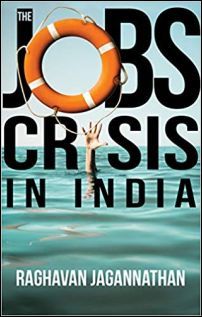'Don't waste your time in doing long pointless graduation courses.'
'Try and get into an apprenticeship or a job after Class 10 or Class 12, as there is always time to get back to academics and learn new skills.'
'We have to get into the American mould where you study as you work.'

After graduation every youngster dreams of either starting a business or finding a well-paid job.
But in this age of automation and artificial intelligence, is it easy, even possible, to find the right job?
If this and other questions on your career are lurking in the corner of your mind, then Raghavan Jagannathan, editorial director, Swarajya magazine, has the answers in his latest book, The Jobs Crisis in India.
In the book, Jagannathan explains how the nature of jobs is changing and how it is important for people, even those who are employed, to re-skill themselves regularly so that they do not become redundant.
Jagannathan, who has worked for publications as varied as Business Standard, Business World, Business Today, India Today, Financial Express, Forbes India and DNA, as well as the portal Firstpost.com brings 42 years of expertise in writing this book.
"Normal graduation courses have no future as far as jobs are concerned," Jagannathan, below, tells Rediff.com's Syed Firdaus Ashraf. The first of a two-part interview.
Have you analysed why in our country people expect governments to give them jobs?
People expect too much from the government. And in India, governments have not proved to be job enablers, but rather are job disablers.
This is largely because the government spends most of the revenue that it gets on freebies instead of creating basic things like infrastructure, health and education, which actually enable job growth.
This is the mistake we make in India. Instead of creating infrastructure for farmers, we give farm loan waivers and ultimately get into the same trap three years later.
 Same is the case with jobs. You keep on creating a disabling environment where setting up a new company is tedious and running it is even more painful.
Same is the case with jobs. You keep on creating a disabling environment where setting up a new company is tedious and running it is even more painful.
People will rather automate than create jobs.
As automation takes root in a very big way in many industries, this problem is getting worse.
The government's prime focus should be on creating jobs in the private sector also.
If they don't do that, people will feel that jobs are available only in the public sector and thus end up demanding job reservations.
Why has no one in government been able to come up with such a vision, till date, about what you just said on creating jobs?
Largely because our electoral system has ensured that anybody who gets 30 to 35 per cent of votes can get a majority.
It means that at any point of time, they (political parties) have to please only 1/3rd of the population. Thus, they don't bother about whatever is good for 100 per cent of the population and concentrate on whatever is good for only the 30 per cent.
Today they will give reservations to Gujjars, the next day they will say they will give reservation to the Marathas. Even then the job problem will not be solved.
But if you get all of them (different communities) to vote for you they (political parties) will win elections. But their sole focus is only on winning elections rather than on what is good for the economy.
After reading your book on jobs I get the feeling that uncertainty is the only certainty. What do you do in a scenario when even companies on the Fortune 500 list don't last for more than 14 years? And in such a scenario what do you do if you are in the job market?
The longevity of all large companies is shortening and longevity of small companies, in any way, is short so what is really happening is that technology is upending business models of large companies.
The trend is certainly visible in foreign countries and now in India too this is happening. When longevity comes down, it means people will need to constantly think in terms of how they need to re-skill.
Today, say you are in an administrative job in a large company and tomorrow your owner automates the process and you no longer have any future in that company. He will give you six months' salary and send you off.
If your only skill is average administration, which is easy to learn, you don't have a future.
When companies themselves have such short lives, how can they employ you for 30 years till you retire? They can't. As a matter of fact, they may fold up even before you retire.
Today you are seeing that process in India where the insolvency code is invoked to ensure that bankrupt companies get sold and only some like steel or cement companies are revived.
Most of the companies are getting only 10 per cent of their loan value, which means they will sack all the workers first. Whoever buys the assets will use the land to set up something new.
So people will have to think in terms of constant re-skilling.
About companies folding up you made a point in the book -- be loyal to yourself and your future first, your employer comes later. What message will you give to youngsters through your book?
Don't waste your time in doing long, pointless graduation courses.
Try and get into an apprenticeship or a job after Class 10 or Class 12, as there is always time to get back to academics and learn new skills.
The important thing is to get a job.
If you are vocationally oriented, then do apprenticeship rather than graduation.
 In India, unfortunately, most graduation courses do not automatically ensure a job unless you are from the IITs (Indian Institutes of Technology) or some such high tech institutes.
In India, unfortunately, most graduation courses do not automatically ensure a job unless you are from the IITs (Indian Institutes of Technology) or some such high tech institutes.
Normal graduation courses have no future as far as jobs are concerned.
There is no point in doing an economics course because you don't need a million economists or million historians or million sociologists.
Learning all those things do not skill you for a job.
We have to get into the American mould where you study as you work.
Worse case scenario: You drive Ola or Uber and continue with your studies.
Such jobs are almost always available, but our Brahminical mindset ensures that we sit behind a desk and work.
Ultimately, we will have to change our attitudes to jobs.
Like Prime Minister Modi, you too say in your book that a pakora seller is also doing a job. But isn't it true that in our society a person who goes to office brings more dignity to his family than someone selling pakoras, even though the latter may be making more money?
That is the whole problem. Today, when the Uttar Pradesh government gave an advertisement for a peon's job, some three lakh people applied and that included PhD degree holders.
The reason is not that they don't have a job but the real reason is that they want a government job.
While in the private sector they will get a salary of Rs 10,000, a government job will fetch them Rs 25,000. Moreover, it is a permanent job.
Today, it is impossible to not get a job in an urban area, but the salary may not be good. That is the real issue.
If people keep demanding government jobs, it is not going to happen.
Rather, you have to think in terms of how to you can keep skilling yourself even when you go up the jobs ladder.
Why does society give more respect to a man who is in a private job vis-a-vis a pakora seller?
It is changing now.
Over a period of time, and especially during colonial rule, people who took clerical jobs felt that it is better to take an office job and lord over others rather than working in the fields or starting a business.
That is the problem, but I think it is changing now.
Last time I took an Ola the driver's surname turned out to be 'Tiwari' -- probably a Brahmin. I think people's attitudes are changing, albeit slowly.
Jobs such as driving Ola or Uber turn human beings into the Greek mythological character Sisyphus. The same routine of driving for 12 hours a day -- is that good for him, even though he may not be interested in driving a taxi?
You have to accept the dignity of labour no matter what your situation in life is.
Let's say you want to be an academician, you can still drive Ola/Uber for four hours, do your studies and then become a professor. That is always possible.
But don't assume that what you are doing is demeaning.
You can always upscale your skills. However, the job of a professor is also becoming largely redundant.
If I am telling you that doing a graduation course is of no use, so naturally what is the use of all those professors?
After 10th or 12th you need to get a job and learn specialisation -- say coding of Python -- because big data technology is growing.
Thus doing a 3-year graduation course in non-technical subjects is a waste. The college model itself will lose out because nobody would want to do those courses.
In fact, some companies, like HCL Technologies, are already doing that. They are not recruiting coders after they finish science graduation. They are taking students after 10th and 12th, teaching them coding skills while they are continuing with their studies, and then absorb them in the company.
The whole hiring process is thus highly cost-effective.










